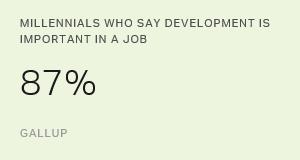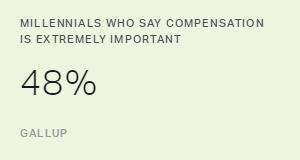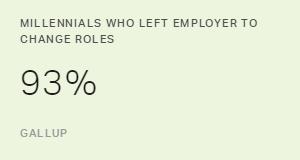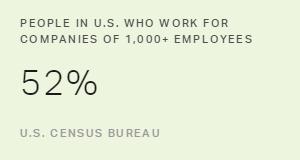Story Highlights
- Development is a top factor in retaining millennials
- Millennials value development more than other generations do
- A majority of millennials are not getting opportunities to learn
Millennials fundamentally think about jobs as opportunities to learn and grow. Their strong desire for development is, perhaps, the greatest differentiator between them and all other generations in the workplace.
Gallup's latest report, How Millennials Want to Work and Live, reveals that 59% of millennials say opportunities to learn and grow are extremely important to them when applying for a job. Comparatively, 44% of Gen Xers and 41% of baby boomers say the same about these types of opportunities. Millennials assign the most importance to this job attribute, representing the greatest difference between what this generation values in a new job and what other generations value.
Millennials care deeply about their development when looking for jobs and -- naturally -- in their current roles. An impressive 87% of millennials rate "professional or career growth and development opportunities" as important to them in a job -- far more than the 69% of non-millennials who say the same.
Development Is a Big Miss for Organizations
Millennials' relatively greater emphasis on development might be, in part, related to their stage of life. Gallup has found that "opportunities to learn and grow" is one of the top three factors in retaining millennials and the only aspect of retention that separates millennials' needs from those of non-millennials.
Regardless of the reasons behind millennials' desire to enhance their skills and further their careers, this aspect of employee development is a missed opportunity for managers. Though millennials are most interested in opportunities to learn and grow, only 39% strongly agree that they learned something new in the past 30 days that they can use to do their jobs better. Slightly less than one in two millennials strongly agree that they have had opportunities to learn and grow in the past year.
To make matters worse, millennials expect these learning experiences to be valuable, but only one-third strongly agree that their most recent learning opportunity at work was "well worth" their time.
Millennials Don't Want to Wait
One of the most consistent criticisms aimed at millennials is that they haven't "earned" their right to receive development opportunities. They shouldn't expect a company to invest in them until they can show they are worthy of such an investment. They aren't entitled to or owed the opportunity to develop.
Managers need to recognize that millennials don't feel entitled; they feel empowered. They want to expand their knowledge and skills, they want to be useful, and they want their work and workplace to have meaning to them.
In millennials' eyes, development shouldn't only come through tenure. Millennials want managers to find ways to invest in their futures, hone their skills and coach them to become the best workers they can be -- starting today.
The problem is that managers are not providing the development opportunities millennials want, and the opportunities they do offer are missing the mark. Managers need to know how each employee best learns and ensure that he or she is learning through various outlets. These outlets could include new responsibilities and tasks that allow employees to expand their knowledge and experience such as planning an event, managing a project or leading a meeting. But employees should also have an opportunity to take part in more formalized learning through classes or coursework.
Managers: Be Proactive
Gallup has discovered that 93% of millennials left their company the last time they changed roles. While their motivations for leaving may vary, some millennials might have switched companies because they believed they had little to no opportunity for growth.
Conversations about development are vital to millennial workers' retention. However, these workers generally do not exude high levels of comfort or confidence in talking to their managers. For example, millennials want feedback about their role, but they rarely ask for it. They want their managers to care about them as people, but only 29% of millennials strongly agree that they feel comfortable discussing their life outside of work with their manager.
Millennials might simply be unsure about how to have developmental conversations with their managers -- especially when they are interested in pursuing different career paths. They may worry that their managers will perceive them as disloyal or flight risks.
Managers need to be more proactive and thoughtful when it comes to opening conversations about growth and development with their millennial workers. These conversations could go far in helping millennials understand that they have a place in their company -- now and in the future.
Download Gallup's report, How Millennials Want to Work and Live, for insights into what matters to millennial employees and how managers can deliver on it.




